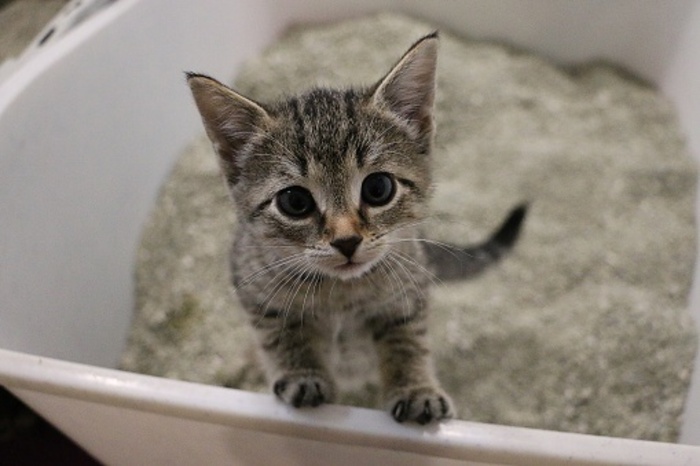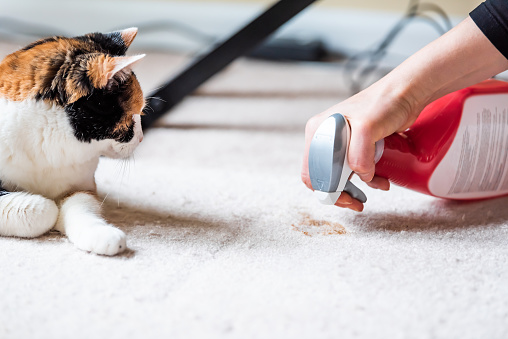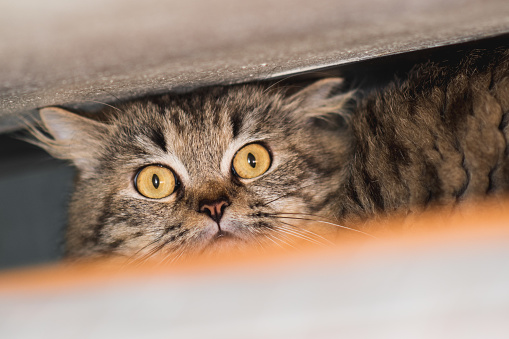
One of the most unpleasant experiences for pet owners is when their beloved paw friend (a dog or a cat) is peeing outside the litter box / the area at home specially designed for this purpose. A repulsive odor, stains, hard to remove, and developing a bad habit in your pet are some additional issues, that accompany the bad behavior. As you may know dogs and cats have different habits in regard to the process of relieving. Although litter boxes for dogs have become very popular among dog owners, canines do not have the instinct to bury their waste. They may bury their excrement occasionally, as they may want to hide their odor from potential predators. However, they are more likely to want to affirm their presence and just “say” to other dogs, that this territory is already marked. Cats, on the other hand, have a natural instinct, which is evolution-related, to bury their waste. That is why cat owners typically use litter boxes for their meowing paw friends at home.
Since cats naturally look for places to pee and poop, where they can bury their feces, aren’t they supposed to use their litter boxes at all times? There may health- and behavior-related reasons why your cat is peeing outside the litter box, that we want to discuss today.

There are different health conditions that may cause your cat to urinate outside his/her litter box such as:
Diabetes, kidney disease, infection of the urinary tract, loose bladder, arthritis, ureteral obstruction and even cancer.
When You Should Bring Your Cat to a Veterinarian
If you are not sure if the problem is based on a health condition or a behavioral issue, there are a few signs that may help you recognize an underlying health issue. These are:
Your cat is using vocalization like meowing, hissing, squeaking while urinating, which indicate that he/she may be in pain;
If you notice that your cat can not pee more than several drops, there might be a health problem as well;
A very obvious sign of a health issue is when your cat is hiding and is refusing to be petted (if they normally enjoy being petted), as well as any behavioral changes;
Decreased appetite and vomiting are other signs of health issues;
If you notice that there is blood in the urine, you also should contact a veterinarian immediately;
If your cat is straining, you should arrange an appointment as well. This may be caused by constipation, which is not so serious health condition, however, straining and constipation should not get confused. That is why we would recommend that you consult a veterinarian for a professional opinion. Unwanted behaviors like urinating outside the litter box are more common in male cats.
If you did not notice any deviations in your cat’s behavior like-they are not hiding, they are eating normally, and are not vocal while relieving themselves, you can wait a day or two (at maximum) to monitor their behavior prior to arranging a vet appointment. If you can not say for sure whether your cat’s behavior changed or not, you should call a veterinarian as soon as possible.

Behavioral-related Causes may be divided into the following sections:
1. Marking behavior;
2. Your cat does not like their litter box;
3. There are stress triggers in the cat’s environment.
Marking Behavior
If you have a male cat who is not neutered, this might be the most common reason why they are urinating outside the litter box. The age of 6 months is recommended by most veterinarians as a suitable age for male cats to go through this procedure.
Why Your Cat May Not Like Their Litter Box
Most cat owners have switched several types and brands of litter boxes as well as types of litter box fillers prior to finding the best one for their cats. The most common litter box fillers are of clay, pellets (recycled paper) and crystals (silica-based).
The Litter Box May Not Be Suitable for Your Cat
Your cat may be displeased with the filler or the litter box itself. We would recommend that you ensure that the litter box is large enough so that your cat can use it effortlessly. Since some litter boxes have lids or hoods, you should make sure that they do not obstruct the access to the litter box and prevent your cat from using it.
The Litter Box May Be Dirty
Do you remember the last time you cleaned the litter box of your cat? If no, then this might be a problem. Cats want to have this area regularly cleaned, so you should make a reminder to remove the excrement from the litter box at least once a day (or twice).
The Litter Box Filler Has a Scent
Any artificial scents may repel your cat. Prior to buying s litter box filler, you should make sure that it does not have a strong scent.
Many Cats And One Litter Box
If you raise more than one cat at home, you should provide them with all the necessary supplies to feel comfortable. Use separate litter boxes and food/water bowls for each cat.
You Have Changed the Litter Brand/Type
Cats and dogs like having a routine and enjoy predictability as they provide them with a feeling of safety. Once your pet gets used to a certain supply, they may not enjoy it being switched to a different one.
Stress Triggers Inducing Unwanted Behavior In Your Cat
There are many factors, that can cause stress in your cat, which may lead to various unwanted behaviors like urinating outside the litter box. Such stress triggers might be:
You Moved to a New Home
Abrupt environmental changing may lead to high stress levels in your pet. New surrounding, new feeding/sleeping/playing/ relieve area, new boundaries... Your cat may need some time to get used to the new home and incidents may happen meanwhile.
Your Cat Is Suffering From Your Absence
You have been returning home late for some time, and your cat has to spend the entire day alone? If your routine suddenly changed, and you can not spend so much time with your paw friend, they may suffer from your absence and develop bad habits. Try to find time for your beloved pet-play with them, pet them, they need attention just like humans do.
You Welcomed a Baby
Although welcoming a baby is a wonderful event in our lives, it may cause stress in your cat. An unfamiliar human being, permanently settles in your home, so the stress levels in your cat may increase for a while.
You Welcomed a New Pet
You’ve recently brought a new puppy or a new cat home? If yes, there is no wonder, that your cat may act weirdly. Your paw friends will need some time to get acquainted with each other. Also, you may want to consider spraying/neutering them (if both of them are male cats or a male and a female cat) in order to prevent signs of aggression and any types of unwanted interactions.
You Lost a Pet
If your cat was really close to another pet home that passed away, he/she may suffer. Urinating outside the litter box may be a sign of anxiety/depression due to their friend’s loss.
Location of the Litter Box
You should make sure that the litter box of your cat has a suitable location. This means that the area should not be too noisy, draughty or crowded. You may want to check if there are any people or animals that may disturb your cat and stop them from using the litter box.
Diet Change
As we mentioned above cats like routine and any changes in it may cause stress. If you have recently changed your cat’s diet, i.e. switched to food low in fat, this may have made your cat anxious. We would recommend that you do not make drastically changes in your cat’s food or feeding schedule, but change it gradually.
Rearranging of the Furniture
This is only a cosmetic change, that will make your home cozier and more comfortable, isn’t it? For your cat things may not look that way. Changes in the environment may increase the stress levels in your paw friend whether a cat or a dog.
What You Should Not Do When Your Cat Is Urinating Outside the Litter Box
Do not force your cat to use the litter box (by dragging them to or rubbing their paws or faces in the litter box), as this may increase the stress levels.
Also, you should not punish your cat by yelling at them or isolating them in a locked room with the litter box. Do not use ammonia cleaners, as they may attract your cat to urinate on the same spot. The reason for that is that urine contains ammonia.
We would recommend that you supervise your cat’s behavior and take actions accordingly.










